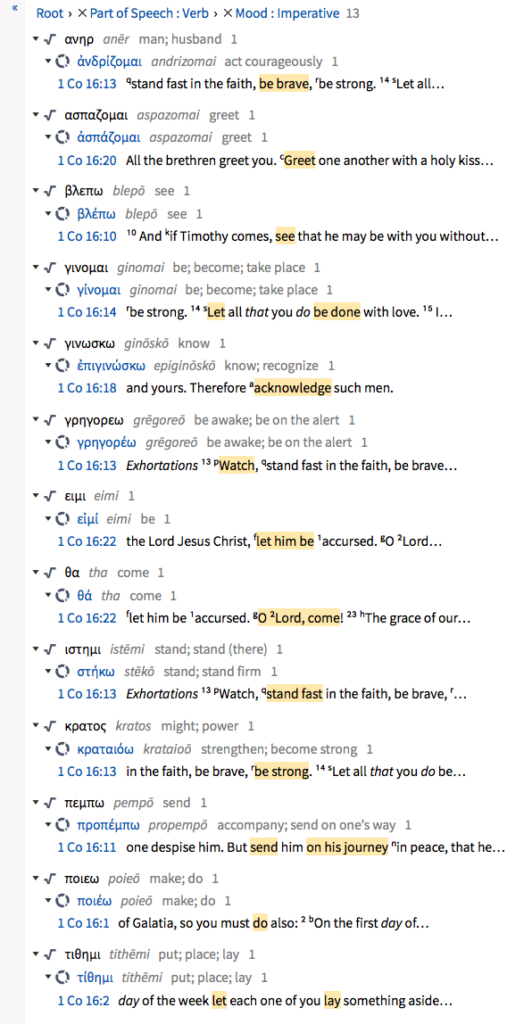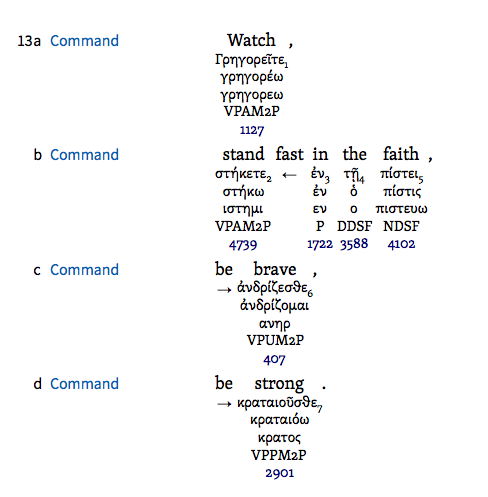Updated 5/10/18
The study notes of the short, closing chapter of 1 Cor is below.
Study Notes for 1 Cor 16
The full notes with the clausal interlinear and morphology codes is here:
1 Cor 16 NKJV Clausal Interlinear Morph Codes
A simple comparison of the NIV and ESV translations of 1 Cor 16 is below. The left column is the NIV, the right is the somewhat more literal ESV:
1 Cor 16 NIV, ESV
The NIV version is handy as there is an online resource whereby the mellifluous Max MacClean does his reading in NIV. There is also an ‘app’ with the same feature: YouVersion (but Max only reads the NIV).
Imperative Verbs
Closing chapters, such as this one, are often skimmed over because they seem to have mostly personal details all of which have long since become irrelevant (because every named person is dead). However, embedded here, as elsewhere, are some timeless truths.
Below are the imperative verbs in the chapter, 13 of them:
There is one particularly notable verse, 1 Cor 16:13, that has four imperative verbs in a sentence of just seven Gr words, two imperatives at the beginning and the end, with the middle three words being “in the faith.” Remarkable, and worthy of reflection. See the below graphic. VPAM is the morphology code for Verb in the Present Tense, Active Voice, Imperative Mood; VPUM differs in that the voice is undefined (it could be active or passive, by the context likely active); VPPM is passive, meaning not “passively” but placing on oneself the continuing demand of “being strong.”
Charitable Giving
This chapter has an important passage about charitable giving. A few things should be noted:
- It was a one-time gift (or at the very least, an episodic event, not a regular contribution),
- It was for a unique physical need (of the fellow believers were were particularly disadvantaged living under Grace, not the Mosaic Law, in a land where the Pharisees and other leaders would shun such believers, cutting them out of the economic system),
- It did not impose any prescribed contribution on anyone: each should give in some proportion “as he may prosper” 1 Cor 16:2).
Tithing?
A lightning rod issue in the organized church, especially “the religion industry” (see this discussed elsewhere on this site) is the subject of “tithing.” The word comes from the Hebrew and is prominent in the OT. It means, literally, “a tenth.”
In contrast to the OT, where the word occurs 33x, reference to the tithe occurs only 8x in 7 verses in the NT (NKJV), 3x in the Gospels (Matt 23:23, Lu 11:42, 18:12), and 5x in the Epistle to the Hebrews (all in one Ch, 7: Heb. 7:5, 6, 8, 9). And in all of the NT occurrences it does not teach tithing as a NT practice, again in contrast to the OT use of the term. The word tithe or tithing never occurs in Acts, or any of the Epistles (except Hebrews Ch 7 as just noted), nor in the Book of Revelation. Further, the 3x in the Gospels are all in a negative context where Christ is admonishing the Pharisees as being utter hypocrites, whereby they were using their practice of tithing not to honor God but to honor themselves, as being super righteous, and thereby truly the loved ones of God. The 5x in Heb. 7 do not teach NT tithing. That passage references tithing only for the purpose of expounding on a particular significance of the Mosaic Law, which actually highlights that such tithing is not a then (and now)present NT reality.
Where, then, does all the NT tithing teaching come from (especially by the religion industry)? Such teaching stems from the OT, especially Malachi 3:
6 For I the Lord do not change; therefore you, O children of Jacob, have not perished. 7 Ever since the days of your ancestors you have turned aside from my statutes and have not kept them. Return to me, and I will return to you, says the Lord of hosts. But you say, ‘How shall we return?’
8 Will anyone rob God? Yet you are robbing me! But you say, ‘How are we robbing you?’ In your tithes and offerings! 9 You are cursed with a curse, for you are robbing me—the whole nation of you! 10 Bring the full tithe into the storehouse, so that there may be food in my house, and thus put me to the test, says the Lord of hosts; see if I will not open the windows of heaven for you and pour down for you an overflowing blessing. 11 I will rebuke the locust for you, so that it will not destroy the produce of your soil; and your vine in the field shall not be barren, says the Lord of hosts. 12 Then all nations will count you happy, for you will be a land of delight, says the Lord of hosts. (NKJV)
For any NT application of the above text one needs to apply the OT context in which it occurs and consider (as identified above) the NT teaching. (If you are inclined to apply any teaching of the OT directly into the NT, you are prohibited from wearing any clothing made of blended fabrics–only pure cotton and wool for you–and there are a lot of OT festivals and offerings that you need to observe–I hope visible slaying of lambs and bulls on your behalf does not offend your sensibilities).
What about the commonly-cited Biblical phrase “tithes AND offerings” (Malachi 3:8) suggesting that the NT standard is is not only the tithe but, in addition, something greater than 10%? Again, consider the context, the above passage in Malachi 3 is to “O children of Jacob,” i.e. the Jewish descendants of Abraham, living in Israel, with the Temple and its Levitical priesthood and practices. And the “and” in the LXX is the Gr kai, which does not universally mean “plus” (i.e., in addition); kai often means, actually, “instead” or “by example.” So those hanging their tithing teaching on such passage and in particular the word “and” are hanging by less than a thread, and in my view not intelligently, or perhaps honestly.
In any case, our subject passage of 1 Cor 16 would have an ideal place for the Lord (through the Holy Spirit to have driven the Apostle Paul) to record some reference to:
- That such one-time gift should not supplant in any way one’s regular tithe obligation
- That such gift is what “and offerings” means in NT terms (even citing Malachi 3:8)
But the text does not, and the silence is significant.
Yet, for all of us who are by our fallen nature selfish, this passage clearly teaches that the NT redeemed heart should have and does have a heart for giving away what’s in one’s hand that can be given to those who are in need. R. Kent Hughes has a great insight on this: charitable giving, namely only from one’s heart to glorify God as the Giver of all things, “disarms the power of money” over one’s life. Further, Haddon Robinson has a wonderful YouTube teaching on the meaning of the Good Samaritan Passage. This is a great teaching and also a wonderful example of teaching skill (the late Dr. Robinson is noted as being one of the great preachers, wrote a classic book still widely used in Seminaries, and was a wonderful one-on-one teacher). Here he is:
What you are determines what you see; and what you see determines what you do.
My neighbor is anyone whose need I see, whose need God puts me in a position to meet. [Haddon Robinson on the Good Samaritan passage]
(And once you get started listening to Haddon, you will not want to stop).

